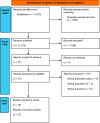Sex differences in psychosocial functioning and neurocognition in bipolar disorder: a systematic review and meta-analysis
- PMID: 40040587
- PMCID: PMC12041736
- DOI: 10.1192/j.eurpsy.2025.27
Sex differences in psychosocial functioning and neurocognition in bipolar disorder: a systematic review and meta-analysis
Abstract
Introduction: Impairment in both psychosocial functioning and neurocognition (NC) performance is present in bipolar disorder (BD) yet the role of sex differences in these deficits remains unclear. The present systematic review and meta-analysis examined whether males and females with BD demonstrate differences in psychosocial functioning and NC performance.
Methods: The Cochrane Library, EMBASE, PsycINFO, PubMed, Scopus, and Web of Science databases were systematically searched from inception until November 20, 2023.
Results: Twenty studies published between 2005 and 2023 with a total sample size of 2286 patients with BD were included. A random effects meta-analysis revealed a statistically significant result with a small effect (SMD = 0.313) for sex differences in verbal learning and memory as well as visual learning and memory (SMD = 0.263). Females outperformed males in both domains. No significant sex differences were observed for any other NC outcome or psychosocial functioning. High heterogeneity and differences in assessment scales used should be considered when interpreting these findings, given their potential impact on results.
Conclusions: Future research should adopt a more homogenous, standardized approach using longitudinal designs to gain a clearer insight into sex differences in this population. This approach so may increase the use of preventative therapeutic options to address the difficult clinical challenge of reaching cognitive and functional recovery.
Keywords: bipolar disorder; meta-analysis; neurocognition; psychosocial functioning; sex.
Conflict of interest statement
Eduard Vieta has received grants and served as a consultant, advisor, or CME speaker for the following entities: AB-Biotics, AbbVie, Adamed, Alcediag, Angelini, Biogen, Beckley-Psytech, Biohaven, Boehringer-Ingelheim, Celon Pharma, Compass, Dainippon Sumitomo Pharma, Ethypharm, Ferrer, Gedeon Richter, GH Research, Glaxo-Smith Kline, HMNC, Idorsia, Johnson & Johnson, Lundbeck, Luye Pharma, Medincell, Merck, Newron, Novartis, Orion Corporation, Organon, Otsuka, Roche, Rovi, Sage, Sanofi-Aventis, Sunovion, Takeda, Teva, and Viatris, outside the submitted work. Marina Garriga has received honoraria/travel support from Ferrer, Janssen-Cilag, and Lundbeck, with no financial or other relationship relevant to the subject of this article. J. Antoni Ramos-Quiroga was on the speakers’ bureau and/or acted as consultant for Biogen, Idorsia, Casen-Recordati, Janssen-Cilag, Novartis, Takeda, Bial, Sincrolab, Neuraxpharm, Novartis, BMS, Medice, Rubió, Uriach, Technofarma and Raffo in the last 3 years. He also received travel awards [air tickets + hotel] for taking part in psychiatric meetings from Idorsia, Janssen-Cilag, Rubió, Takeda, Bial and Medice. The Department of Psychiatry chaired by him received unrestricted educational and research support from the following companies in the last 3 years: Exeltis, Idorsia, Janssen-Cilag, Neuraxpharm, Oryzon, Roche, Probitas and Rubió. Miquel Bernardo has been a consultant for, received grant/research support and honoraria from, and been on the speakers/advisory board of ABBiotics, Adamed, Angelini, Casen Recordati, Janssen-Cilag, Menarini, Rovi and Takeda. Silvia Amoretti has been a consultant to and/or has received honoraria/grants from Otsuka-Lundbeck, with no financial or other relationship relevant to the subject of this article. The remaining authors declare that the research was conducted in the absence of any commercial or financial relationships that could be construed as a potential conflict of interest.
Figures


References
-
- Solé B, Varo C, Torrent C, Montejo L, Jiménez E, del Mar Bonnin C, et al. Sex differences in neurocognitive and psychosocial functioning in bipolar disorder. J Affect Disord. 2022;296:208–215. - PubMed
-
- Curtis V. Women are not the same as men: Specific clinical issues for female patients with bipolar disorder. Bipolar Disord Suppl. 2005;7[1]:16–24. - PubMed
-
- Diflorio A, Jones I. Is sex important Gender differences in bipolar disorder. Vol. 22, International Review of Psychiatry. 2010. p. 437–452. - PubMed
-
- Carrus D, Christodoulou T, Hadjulis M, Haldane M, Galea A, Koukopoulos A, et al. Gender differences in immediate memory in bipolar disorder. Psychol Med. 2010. Aug;40[8]:1349–1355. - PubMed
Publication types
MeSH terms
LinkOut - more resources
Full Text Sources
Medical

